Fruits of the Spirit show the healthiness of our relationship with God. This daily devotional looks at how that relationship must be built on love.
Nuggets
- The fruits of the Spirit help us sanctify our character.
- Since God is love (I Jn, 4: 8) and the Holy Spirit is also love, love should be a distinguishing characteristic to show we are children of God.
To read devotions in the Redo for Godliness series, click the appropriate button below.
Devotions in the Fruit of the Spirit from the Inside Out series
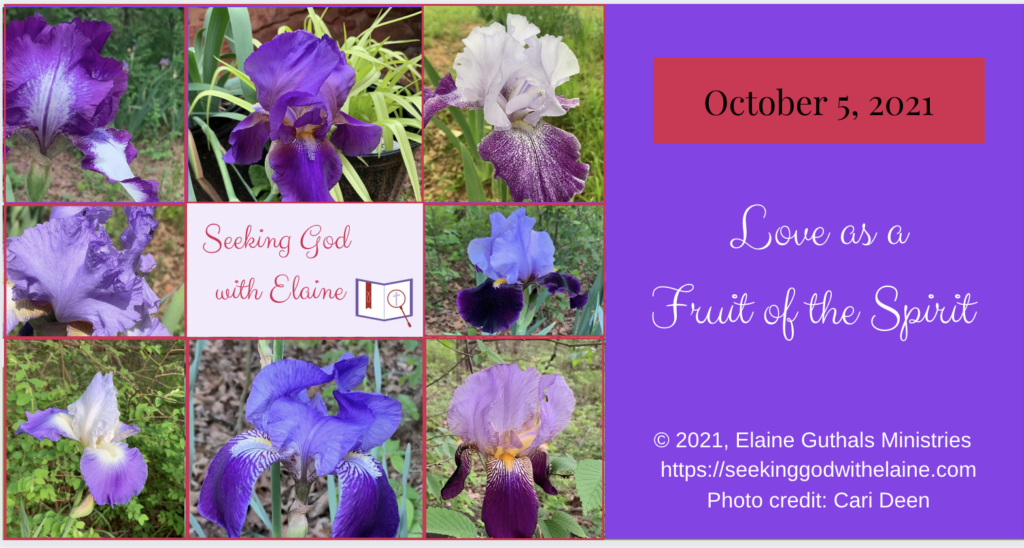
The fruits of the Spirit, sometimes, may seem like a mystery. Oh, we all know about the emotions of them.
But the fruit part may throw us some. We know more about sins of the flesh.
The fruits of the Spirit, not so much. That is because, as Bayley said, “… the life of God in the soul is a hidden life: still it is a real life, producing genuine fruit; cherish therefore and cultivate it.”
Resource
Let’s see what God will reveal to us about the hidden life.
Let's Put It into Context
“But the fruit of the Spirit is love, joy, peace, patience, kindness, goodness, faithfulness, gentleness, and self-control. The law is not against such things” (Gal. 5: 22-23 CSB)
Here is a running list of what we’ve discussed previously.
Fruit of the Spirit
“But the fruit of the Spirit …” (Gal. 5: 22 CSB)
The fruits of the Spirit help us sanctify our character.
I never thought of this as being anything but an exhaustive list. Bayley said it isn’t.
I don’t know why I thought that. I guess maybe because it hits the biggies.
Manning agreed. He noted the first two — love and joy — defined our relationship to God. The rest — peace, patience, kindness, goodness, faithfulness, gentleness, and self-control — defined our relationship with others. I think I would put peace on the God list as it is an inside job from Him.
Resource
Washburn said the faith, gentleness, and self-control are more our conduct. I see that. The list reflects the two greatest commandments and what we are going to do about them.
Resource
Glossary
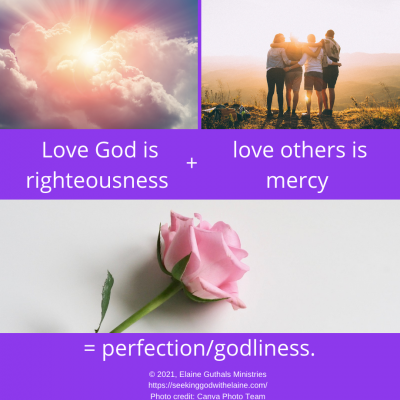
Bayley also said that it can be classified different ways.
- State of the Christian mind
- State of our interaction with others
- Principles to live by
But what makes it a list? How and why do they go together? Bayley told us that, too.
- They come from God.
- They all fall under God’s law.
- Children of God must possess them all.
Whoa! Wait!
We are human. How are we really going to do that?
Bayley basically said we have to. He wrote, “Grace in the soul is the reflection of Christ’s glory (2 Corinthians 3:19); but that can be no true reflection which lacks any leading features of the moral glory of the Saviour.”
Resource
They should be part of our character. They promote the unity Paul kept telling us we should have.
That being said, fruits of the spirit will present themselves differently in different people. It was written in the American Homeletic Review that “grace works on very different natures, and is subject to an endless variety of conditions and modifying influences; so that while the great change has been wrought, the seeds of the new life have taken root in the heart, the form and degree of development will greatly vary in different persons, and different conditions and surroundings. In one, faith predominates, in another, love, in another, charity, etc.”
Resource
Beecher, however, took a different track. He described producing fruit as our goal. If we have a peach tree that doesn’t produce peaches, we aren’t going to get a pie.
No, Beecher didn’t say it that way. He said that fruit show the highest level of development — the perfect level.
Resource
That says to me that we will be working on the fruits of the Spirit all along the Sanctification Road. But we won’t reach perfection until Heaven.
Manning made an interesting observation. He talked about the lack of things before Jesus came. There were no hospitals or orphanages. There were no Save Them from This Disease organizations.
There was no organized charity at all.
Resource
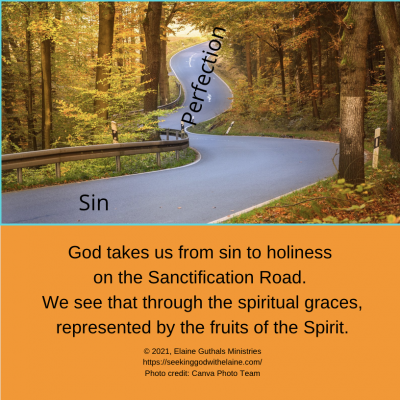
Okay. I have to work through what Washburn is saying.
- God takes us from sin to holiness on the Sanctification Road. We see that through the spiritual graces, represented by the fruits of the Spirit. That is how the hidden life of God in our souls is shown.
- That is shown through how our character changes.
- Having a peace of conscience come over us or a feeling of forgiveness at conversion isn’t enough to identify salvation. We are really good at seeing what we expect to see. It isn’t just about feeling it.
- Others have to see the permanent change in us.
- Our character has to match His; when we do, we will know Him.
- We get the character change down to the heart level.
Resource
Inside Out Love
“But the fruit of the Spirit is love …” (Gal. 5: 22 CSB)
Since God is love (I Jn, 4: 8) and the Holy Spirit is also love, love should be a distinguishing characteristic to show we are children of God.
Manning wrote “Love is that which unites us with God …” I would take that further and say love is the only thing that unites us with God.
Resource
Thornton’s description of love is wonderful. He wrote, “It is by the eyes of the understanding being enlightened to see the perfections of God, the excellencies of Christ, and the unspeakable value of eternal realities, that Divine love is kindled in the soul.”
Resource
Love has a component of obedience to God in it. If we don’t love God, we won’t seek Him. We won’t follow His laws and commandments.
How is love an inside to the outside emotion. Bertram helped us out there. We have to get it to heart level in order to
- Eliminate fear and anxiety.
- Cut out sin because is opposite to what God is.
- Leads us toward holiness.
- Makes obedience less challenging.
- Helps us to be living sacrifices.
- Makes our souls more pleasing to God.
Resource
We’ve said that sanctification is a process. Murray contended that love as a fruit of the Spirit isn’t. It is what we reach at the end of many processes.
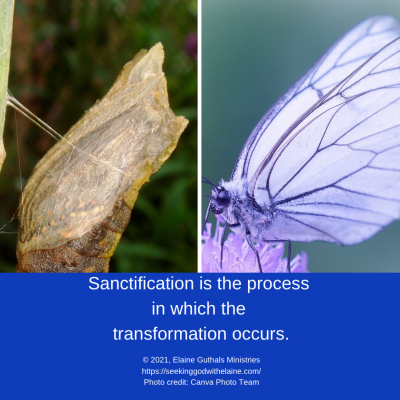
So, let’s break down what Murray said.
- Love doesn’t happen by accident.
- Even though human nature is sinful, it is forceful.
- The actions of the Holy Spirit are not solely a result of our actions.
- Punishment can be instantaneous, where our growth takes our lifetime.
- The Holy Spirit uses our abilities to grow us.
Murray reminded us that we cannot think of God only as up in Heaven. We have to remember He is inside us, too.
I was agreeing with Murray until he got to talking about power. He wrote “But, friends, he who exalteth his own power exalteth God; for is not God the maker of his power?”
Resource
I think I see what Murray is trying to get at. When we use our talents and strength, we are glorifying God because He made us to be able to do what we do.
I am just tripping over “… he who exalteth his own power exalteth God …” But we only exalt Him when we do what He has called us to do His way.
Plus, we don’t want to get big heads. We can’t think we are doing it on our own. We are nothing without God.
To me that strikes too close to what Paul warned us about. “What should we say then? Should we continue in sin so that grace may multiply? Absolutely not! How can we who died to sin still live in it?” (Rom 6: 1-2 CSB).
We can’t do something self-focused and think that will glorify God. That isn’t loving God.

What the Holy Spirit is trying to do is to get us back to where Adam and Eve were before the original sin. Murray wrote, “The work of the Spirit is to bring back and reinstate in its original regnancy the Divine characteristic of loving.”
Resource
God wants us back to the level of love we had. Emmons contended that happened in regeneration.
- Regeneration is being changed from spiritually dead to spiritually alive and the internal requickening in us that God brings about through the work of the Holy Spirit to give us new character.
- Spiritual death is the separation from God that occurred as a consequence of Adam and Eve’s original sin. The spiritually alive are those who have ABCDed, so they are no longer separated from God.
Glossary
Emmons argued that Paul did not identify love as a new love. Remember, he keeps saying that we are new creations. We are changed at regeneration from our old self to our new self.
Glossary
There is no previous foundation on which to build this love. Emmons argued that love is the foundation, not regeneration.
I can see that. Regeneration is the process God does to change us from spiritually dead to spiritually alive.
Regeneration can’t happen if the love isn’t there.
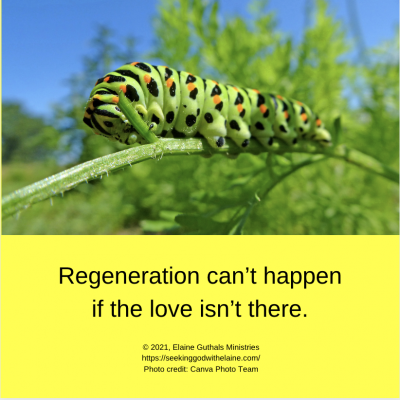
I’ve got to process what Emmons said. He wrote, “If the Spirit of God produces nothing but love in regeneration, then there is no ground for the distinction which is often made between regeneration, conversion, and sanctification. They are, in nature and kind, precisely the same fruits of the Spirit.”
Resource
I can get the question about how are all these terms different. That is one reason I turned into Dictionary Chick. I needed to make the distinction among everything.
If we look at it a certain way, I can see no difference between regeneration and sanctification. If we think regeneration is one of the three-level words, they are similar.
We were regenerated and switched from spiritually dead to spiritually alive at conversion. That makes conversion and regeneration the same.
If we think we are in the process of being regenerated as we live our lives, that is sanctification. Sanctification is the process by which we are regenerated.
Regeneration/sanctification is not going to be complete until we are perfected when we reach Heaven.
I guess, I look at conversion as the decision we make to ask Jesus to be our Savior and Redeemer and God to be Sovereign Lord of our lives. Regeneration is the result of that decision.
Regeneration is what happens to change us to have God’s character. Sanctification is the process to do that.
Worldview people can believe that their definition of love is God’s definition. They believe in what Thornton called a love of benevolence. In Elaine-speak, that is loving the sinner even if we don’t love the sin.
If worldview people left it there, that would be what God wants. However, worldview people want their sin to be loved, too — or at least tolerated.
God wants us to have a love of compliance. That means we love God and Who He is. It also means we love what looks like Him.
Resource
If we don’t love God, our service won’t be acceptable. Nothing we do can earn us His salvation and love.
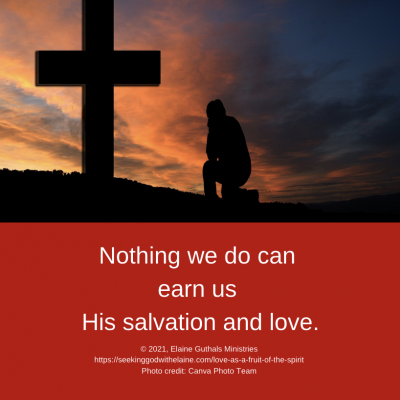
Connecting Love to the Other Fruits
If we don’t have the faith, the love is a secular love. That makes it useless in applying it to eternity.
Faith is the only way to salvation. Love is not going to cover a lack of faith.
Don’t believe me? Murray wrote this, “By faith we perceive the loveliness of this principle; by faith we are made appreciative of it and are filled with longing that we may overflow with it; by faith we are thus quickened into this new life of concord and amiability and good-will toward men, and hearty affection toward God.”
We are quickened into the new life.
Regeneration is being changed from spiritually dead to spiritually alive and the internal requickening in us that God brings about through the work of the Holy Spirit to give us new character.
This quickening comes through regeneration. Regeneration comes through conversion.
Resource
And it all starts with love.

Making the Connections
We cannot discount the influence of the Holy Spirit on our minds. We won’t be able to understand God’s love until the Holy Spirit stirs our desire to know Him.
We are going to need help to subdue our sinful nature. We will only do that through God’s love.
How Do We Apply This?
- Walk with the Spirit.
- Pray for grace.
- Seek God to transform our character to His.
Resource
Searching for and Seeking God
Hearing His Word (Rom. 10: 17).
Reading His Word (Rev. 1: 3).
Praying to Him (Heb. 4: 16).
Studying His Word (Ac. 17: 11).
Meditating on His Word (Ps. 1: 1-2).
Memorizing His Word (Ps. 119: 11).
To read a related devotion, click the button below.
Father God. Love is the foundation of our salvation because You are love. Help us to grow to love You more each passing day. May we have Your character of love so that we love You and others. Amen.
What do you think?
Leave me a comment below (about this or anything else) or head over to my Facebook group for some interactive discussion.
If you don’t understand something and would like further clarification, please contact me.
If you have not signed up for the email daily or weekly providing the link to the devotions and the newsletter, do so below.
If God has used this devotion to speak with you, consider sharing it on social media.